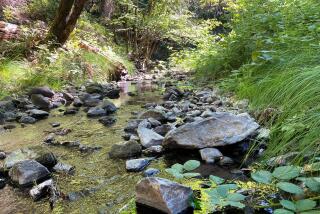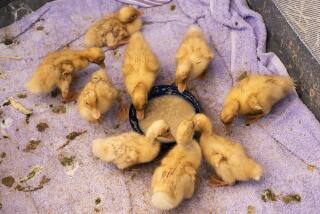Officials Warn of Selenium Peril at Duck Clubs
LOS BANOS, Calif. — About 16 duck-hunting clubs in western Merced County are using selenium-tainted drainage water to raise crops and water marshes in the dry summers, Grasslands Water District officials said.
Water district officials are urging state and federal wildlife agencies to penalize the duck clubs for using the tainted drain water, which could pose a serious threat to reproductive systems of migratory waterfowl.
Dave McCabe, secretary of the grasslands board, charges that government agencies haven’t cracked down on errant duck clubs for using the drainage water. Most of the district’s 160 duck clubs already have refused to run the drainage water across their fields to raise forage crops for cattle grazing.
“I’m tired of the wishy-washy attitude on the part of government,” McCabe said.
He said that next month the first of the season’s ducks will arrive in the region and will be exposed to dangerous levels of selenium.
“Virtually the only water awaiting them will be polluted water. These are our potential breeders and they may be sterilizing themselves,” McCabe said.
Joel Miller, a federal Fish and Wildlife Service biologist in Los Banos, said he is not entirely convinced that selenium poses a threat to ducks in the grasslands area.
“Because we don’t have any concrete evidence to support the circumstantial evidence (of damage caused by selenium), we haven’t had a whole lot of leverage to go into the . . . clubs and make them stop using the drain water,” Miller said.
In the case of Kesterson Reservoir, drainage water from the Westlands Water District accumulated for several years in storage ponds west of Los Banos. The water caused the high levels of selenium that is blamed for many bird deaths and deformities.
The drainage water is used differently in the grasslands district. Farm drain water enters the marshes and eventually flows through and is released into the San Joaquin River or its tributaries. And studies have shown high selenium levels in seeds collected from grasslands marshes; the seeds are a primary food source for the ducks.
More to Read
Sign up for Essential California
The most important California stories and recommendations in your inbox every morning.
You may occasionally receive promotional content from the Los Angeles Times.










